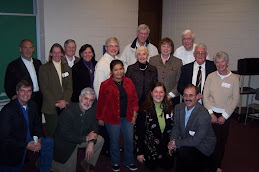One of my most memorable theological discussions was with a precocious Third Grader. It went like this:
Jesus was God, right?
Yes, we believe Jesus was the son of God.
And Jesus was a real baby, right?
Right, a baby just like you and me.
So did Jesus need to have his diapers changed?
Well, yes, He was a genuine baby, you know.
Then that must mean that God had to have his diapers changed. That’s amazing!
That interchange many years ago has prompted many thoughts about the Incarnation and about the heart of God. But it also brought thoughts about diapers and the meaning of love.
Jesus was God, right?
Yes, we believe Jesus was the son of God.
And Jesus was a real baby, right?
Right, a baby just like you and me.
So did Jesus need to have his diapers changed?
Well, yes, He was a genuine baby, you know.
Then that must mean that God had to have his diapers changed. That’s amazing!
That interchange many years ago has prompted many thoughts about the Incarnation and about the heart of God. But it also brought thoughts about diapers and the meaning of love.

First, diapers and love. As the firstborn in our family, one of my early tasks was to take care of the soiled diapers of my siblings as they came on the scene. It was sort of a ritual. Mom or Dad changed the baby, rolled up the used diaper and handed it to me. I took it to the bathroom and dumped the contents into the toilet, and then soaked it in a big pail. (We had cloth diapers in those days. No Huggies or Pampers. Our fortunate neighbors had wealthy grandparents who gifted them with a year long diaper service.) Mom would wash the diapers, hang them on the line, fold them and put them on the pile in the baby’s room for further use. It was a lot of work, which represented a lot of love.
It also involved two aromas. The first was the awful smell of a dirty diaper. The second was the wonderful smell of the baby powder which my folks applied to the bottom of the newly changed baby. The whole enterprise alerted me to the fact that my parents had done all of that for me too. And also that Mary and Joseph did all of that for their child, Jesus. And that, in so many ways, God cleans up our unsavory messes again and again throughout our lives. That’s what real love is.
Parents always breath a huge sigh of relief when a child is finally potty trained. And kids are very proud of themselves when they cross that threshold. But one of the sad facts of life is the realization that some of us may have to endure the indignity of needing diapers ( Depends?) in our so-called Golden years. Someone – a spouse, a child, a friend, a stranger – will help us, we hope. And we also hope that we might have the God-like graciousness and humility to appreciate them and thank them.
Theologians have theorized about the way in which the divine and human knowledge of Jesus may have coexisted in the Incarnation. Did the Lord share not only the experience of the innocent child who needed its diapers changed, but also the awkwardness of the senior citizen who is aware of it?
Christmas is the season of beauty and color and music and parties and gifts. It seems impertinent to soil the season with thoughts about diapers, of all things. However, such thoughts remind us that human life is messy, untidy and earthy. God made us the way we are – rational animals, but animals nonetheless. And God, who is love, rejoices in the amazing love of millions of parents, unsung heroes, who change diapers. This Christmas we might offer a prayer of thanks to those, living or dead, who did it for us. And we might think of that old joke that, if the three Magi had been women, they wouldn’t have brought gold, frankincense and Myrrh to Bethlehem. They’d have brought a casserole and a pack of fresh diapers.
--Baltasar










